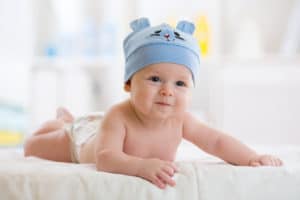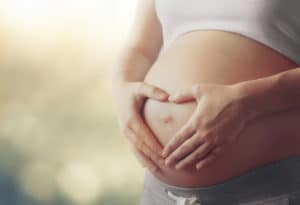How can you prevent giving birth to a herpes baby? What can you do if you are infected with herpes, herpes lip or genital herpes?
Or worse, what happens if herpes viruses have infected your baby?
Table of contents
Herpes – A Harmless Virus?
According to the WHO, more than one third of the world’s population is infected with the herpes virus. In Germany alone, 67 percent of people up to the age of fifty are infected.
It feels like almost everyone has had a herpes lip at some point, right? At least everyone knows at least one person in their immediate family who suffers from cold sores from time to time or is affected by it themselves.
One after the other, what exactly are we talking about when we talk about the herpes baby?
What Are Herpes Viruses?
Herpes viruses belong to the family Herpesviridae. A large family with more than 170 different species. Among viruses, they are particularly distinguished by their size and complexity.
The herpesviruses are extremely versatile. Here are the most important species that can be dangerous to humans:
- Herpes simplex virus type 2 – including genital herpes.
- Herpes simplex virus type 1 – e.g. cold sores, genital herpes.
- Varicella-zoster virus – including chickenpox, shingles.
- Epstein-Barr virus – including hepatitis, encephalitis, Hodgkin’s lymphoma.
- Human herpes virus 5 to 8 – various diseases.
With regard to pregnancy, the herpes virus types 1 and 2, as well as the herpes zoster virus can be dangerous for the newborn.
Here we will deal with the two herpes simplex viruses type 1 and 2 (HSV 1 and HSV 2). The triggers of herpes lip and genital herpes.
How Are HSV Types 1 And 2 Transmitted?
Almost all of humanity has come into contact with the type 1 virus. Initial infection usually occurs in childhood without initially causing any symptoms.
HSV 1 is primarily the cause of herpes lip. However, there are an increasing number of cases in which this virus also causes genital herpes. The greatest risk of infection lurks here during oral sex.
Infection with the type 2 virus usually occurs later, with the first sexual contacts. Currently, genital herpes is on the rise worldwide, while labial herpes is slowly declining, at least in the northern hemisphere.
In both cases, transmission of the viruses most often occurs through direct contact with the infectious secretion of the skin vesicles. Transmission through the air or through objects is possible in principle, but rare.
The viruses cannot survive long in the air.
Infected With Herpes And What Happens Then?
After the initial infection, the primary infection, often nothing happens at first. The WHO assumes that this is the case in over 70 percent of cases. The viruses penetrate through the skin and mucous membrane.
They then prefer to nest in the nearby nerve cells. Here they wait patiently for their chance. In medicine, this is referred to as a latent infection. This means that there are no symptoms (asymptomatic), but an acute outbreak can occur at any time.
After infection with herpes viruses.
HSV 1 causes the unpleasant cold sores, a herpes lip. HSV 2 causes the same skin symptoms in its acute phase, only in the area of the vagina and penis (genital herpes).
In some people, the viruses remain in the nerve cells for life and do not budge. In others, they come out as soon as the opportunity is favorable. The following occasions provide optimal conditions:
- Other diseases or infections.
- Psychological stress.
- Hormonal changes (menstruation, pregnancy).
If the viruses immediately encounter a favorable environment, it may take two to fourteen days for the vesicles to break out (incubation period).
However, in most cases the immune system manages to destroy the viruses to the extent that there are no symptoms. However, a few can always save themselves. These then hide in the nerve cells, very close to their point of entry.
Here they are difficult for the immune defense to reach. In the case of HSV 1, these are the cells of the trigeminal nerve (facial nerve). HSV 2 prefers the nerve plexus near the spinal cord as its hiding place.
From there, the viruses can theoretically be reactivated at any time. This is then called secondary infection.
HSV infection, the further course.
In the case of a “successful” primary infection, it can take a good two weeks for the vesicles to heal. If further reactivations occur in the course of life, the unpleasant skin symptoms are usually forgotten after two or three days.
During this active period, there is always an acute risk of infection. The fluid in the vesicles is highly infectious.
There are two notable complications. In the further course of an acute herpes simplex type 1 or 2 infection, encephalitis (inflammation of the brain) may occur, in very rare cases. The second possible complication is infection of the child during and after pregnancy and during birth.
When Is Herpes Dangerous In The Baby?
Almost all of humanity is infected. Nevertheless, not every mother has to fear herpes in the baby. First, learn when the baby can get infected with the virus:
Herpes Infection During And After Pregnancy
During pregnancy, infection would have to be through the blood (transplacental, through the placenta). Although this is possible in principle, it is very rare, as the herpes viruses do not normally enter the bloodstream.
Infection is also possible after birth (postpartum). Newborns do not yet have a developed immune system and are therefore particularly susceptible. The first three months are particularly risky for infections of all kinds.
Nest protection (immunization through the mother’s bloodstream) is not always sufficient. Therefore, extreme caution is generally required in direct contact with a newborn.
Even more so, of course, if the mother or another contact person is suffering from acute cold sores. Contact avoidance and hygiene should then be the first priority.
Herpes During Birth
The far greater risk of transmission of herpes to the baby is when the mother has active genital herpes during birth (intrapartum).
This happens in about 85 percent of cases of a herpes baby: infection with genital herpes through direct contact during the birth process.
An initial infection is particularly risky during pregnancy. It can happen that no, or not enough, antibodies have formed in the mother’s blood to pass them on to the child.
In addition, the acute (contagious) phase is longer in a first infection than in a reactivated herpes outbreak. It does not matter whether the genital herpes was caused by an HSV type 2 or type 1.
In a nutshell, the biggest dangers for a herpes baby:
Transmission of genital herpes most often occurs at birth when the mother has active genital herpes following a primary infection.
In the first few months after birth, the baby can be infected primarily through careless contact with a person suffering from active labial herpes.
Herpes In Pregnancy, What To Do?
As mentioned above, pregnancy can also bring the herpes viruses out of hiding. Unfortunately, this is not so rare.
The immune system is apparently slightly weakened by hormonal changes. If you suffer from cold sores from time to time, it is even very likely that they will flare up once during pregnancy.
The best thing to do is to stay calm, do not touch them and treat them with an antiviral ointment, and they should be forgotten in three days.
No routine testing for HSV 1 or 2 is offered by official sources. The most common examinations during pregnancy are described here.
A vaccine against herpes viruses is currently being worked on. If you are unsure because you or your partner have already had genital herpes, you should definitely talk to your gynecologist about it.
Cold Sores After Childbirth
Cold sores are actually only particularly dangerous after childbirth and then for the first three months. During the acute phase, contact avoidance and careful hygiene are unavoidable.
Even more dangerous for the baby are other persons with active herpes. If you yourself have never been infected, your child will not have received any protection from you.
- In case of cold sores after birth.
- Avoid contact with the child.
- Do not touch blisters with fingers.
- Wear a mouth guard in the same room with the child.
- Wash your hands thoroughly and often.
It is only short, the time of blooming blisters. Strictly adhere to this advice to avoid any risk.
Genital Herpes During Childbirth
If you notice genital herpes during pregnancy, go to the doctor immediately. He will give you antiviral treatment, usually with aciclovir locally or systemically (tablets).
If genital herpes breaks out at term, the baby is delivered by cesarean section as a precaution. The risk of contracting herpes viruses for the first time does not increase with pregnancy. However, one should be particularly aware of the risk of infection then. That is
- It is best to avoid frequently changing sexual partners.
- Condoms can protect.
- Keep in mind the connection between cold sores – oral sex – genital herpes.
- Support the immune system! Appropriate nutrition*, sufficient sleep, exercise and avoidance of stress reduce the risk of activating the viruses.
Recognize The First Signs Of Herpes In The Baby
Even if genital herpes is not an issue with parents, it can still lead to infection, called herpes baby.
But do not panic, this is extremely rare. In these cases, the mother excretes herpes viruses, although she does not show any signs of acute illness. How can you tell if herpes has been transmitted to your baby?
Herpes In The Baby Is Called “Herpes Neonatorum”
Herpes in babies is a serious disease in its own right and cannot be compared to herpes in adults. The crucial difference is the still weakly developed immune system in newborns.
Possible external signs:
- Small herpes blisters all over the skin.
- Corneal opacity.
- Fever.
- refusal to take in food and liquids.
- Vomiting.
- Exhaustion, apathy.
In about half of all cases, the infection spreads to the internal organs, nervous system or even into the blood. The most dangerous complications are sepsis and encephalitis.
The chances of survival for the herpes baby are then low.
In medicine, three forms of progression are distinguished in the case of a herpes baby (herpes neonatorum).
1. The HSV infection is limited to the skin and mucous membranes.
The conjunctiva and cornea are also affected. As a result, the child’s vision may be permanently impaired. With the consequences of impaired vision, corneal clouding or blindness.
The herpes blisters in the mouth area can lead to a complete refusal of food and fluid intake.
2. The infection spreads to the central nervous system.
One week after birth or infection, infants show flu-like symptoms. Some develop the typical blisters, not only in the mouth area. Now it is time to act quickly.
If antiviral therapy is given, the chances of recovery are still 50 percent or more. In the brain, the viruses attack neurological structures and leave behind permanent damage.
Even with a cure, permanent brain damage can limit the child for life.
3. The herpes viruses enter the blood.
In medical terms, the viral infection has then become systemic (blood poisoning). The viruses attack the vital organs via the bloodstream. If immediate action is not taken, multi-organ failure occurs.
In the first, so to speak superficial, form of progression, the chances of survival are good. Nevertheless, rapid action is required, as otherwise permanent visual impairment may result.
In the latter two forms, the prognosis is rather poor. Here, rapid intervention is decisive for life and death.
If there is even the slightest suspicion of a herpes baby, do not lose time, this is an emergency.
Sources
https://www.aerzteblatt.de/archiv/19056/Der-Herpes-genitalis
https://www.pharmazeutische-zeitung.de/ausgabe-472008/neues-aus-therapie-und-forschung/











2 thoughts on “How Dangerous Is Herpes For Your Baby?”